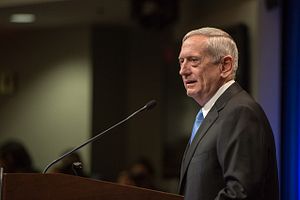U.S. Secretary of Defense Jim Mattis will visit Asia in the coming week, making stops in China, Japan, and South Korea. The trip will be Mattis’ first to China in his capacity as the United States’ top defense official.
The trip will be Mattis’ second trip to Asia this month, following a trip at the beginning of the month that included a stopover in Singapore for the Shangri-La Dialogue, where he delivered a major address on U.S. strategy in the Indo-Pacific region.
Mattis will arrive in China amid heightened tensions between the United States and China over trade, the militarization of features in the South China Sea, and Taiwan. Earlier this month, the new American Institute in Taiwan, the United States’ embassy in all-but-name, drawing attention to the close U.S.-Taiwan relationship.
In China, Mattis will seek to engage candidly with Chinese officials on the state of the military-to-military relationship between Washington and Beijing, which has grown strained since the United States decided to disinvite China from this year’s iteration of the Rim of the Pacific (RIMPAC) exercise, the world’s largest multilateral naval drill.
Mattis recently vocally criticized China’s behavior in the South China Sea in recent months in his speech at the Shangri-La Dialogue, highlighting China’s “deployment of anti-ship missiles, surface-to-air missiles, electronic jammers, and more recently, the landing of bomber aircraft at Woody Island.” He clarified that the decision to disinvite China from RIMPAC was linked to these behaviors.
“The United States will continue to pursue a constructive, results-oriented relationship with China, [and] cooperation whenever possible will be the name of the game, and competing vigorously where we must,” Mattis had said.
On Taiwan, Mattis had underlined that the Trump administration “oppose[s] all unilateral efforts to alter the status quo, and will continue to insist any resolution of differences accord with the will of the people on both sides of the Taiwan Strait.”
But even as competition is an undeniable feature of the U.S.-China relationship today, Mattis will also seek to focus on areas of cooperation with China. The United States and China have several bilateral military protocols and exchanges that continue.
In South Korea and Japan, Mattis will engage in discussions on the state of each military alliance and review the state of regional security amid this year’s diplomatic outreach by the North Korean regime. The U.S. defense secretary’s arrival in South Korea will follow decisions by the alliance to suspend this year’s iteration of the Ulchi-Freedom Guardian computerized command post exercises and to indefinitely suspend marine exchange exercises as well.
After his June 12 summit meeting with North Korean leader Kim Jong Un, U.S. President Donald J. Trump had described joint U.S.-South Korea exercises as “very provocative” and called on them to be cancelled while the United States and North Korea engaged in diplomacy.
Mattis has emphasized the importance of U.S. alliances in the administration’s Indo-Pacific strategy.

































